Advent 1: Jeremiah 33:14-16
 I’m proud of you for being in church today for the season of busyness is upon us. No longer in the causal days of fall activities, and not yet to the Sunday before Christmas (where everyone seems to feel the call stronger to go to church). Seemingly it feels like a not-so special day. But, it is in this post-Thanksgiving, early December date that the excitement of the Advent season begins, the four Sundays on the liturgical calendar of the church where we stop and prepare ourselves for the coming of Christ. This year, we are approaching Advent together as we “Wait With . . .”
I’m proud of you for being in church today for the season of busyness is upon us. No longer in the causal days of fall activities, and not yet to the Sunday before Christmas (where everyone seems to feel the call stronger to go to church). Seemingly it feels like a not-so special day. But, it is in this post-Thanksgiving, early December date that the excitement of the Advent season begins, the four Sundays on the liturgical calendar of the church where we stop and prepare ourselves for the coming of Christ. This year, we are approaching Advent together as we “Wait With . . .”
Many of us have the “hurry up” part down. Maybe not the waiting . . .
We know how to get things done.
Many of us braved the crowds this weekend and headed to the malls to get the first or second round of our Christmas shopping completed like Kevin and I did. Oh, what insanity.
Many of us took that climb into the attic or on the top shelf in our garage to get our Christmas decorations down and have our house look like a disaster zone for many hours until it all started to come into order.
And, then some of us timed ourselves to see how many Christmas cards we could write before we knew the responsibilities of life and work got to us again this coming week filling our kitchen tables with stamps, address labels and cards galore. There always seems to be something to do this time of year.
But, wait? That’s what we are talking about today?
This is not just our forte. By nature we are an impatient people. We like to have things OUR way, when WE want it, don’t we?
When will the train come? How long will this grocery line take? How many more miles till we get there? When will my life get better? When will my husband or wife change? When will I get everything out of life that I wished for?
However, my desire for this Advent season both through the Sunday worship services and the Wednesday night worship services that you and I have the ability to redefine what it means for us to wait for Christmas. And this year instead of focusing on the typical Advent words like hope, joy, peace and love—we’re going to stick with what it means to wait with others.
We’ll wait together for Christmas to come as part of our spiritual discipline of worship. We’ll hope to see this waiting period not as wasted time or meaningless time. We’ll hope to see this Advent not as punishment . .. “Can’t it just be Christmas already?” We hope this waiting period becomes an opportunity to feel in our bones the urgency of the season, urgency to position our lives through a posture of waiting to receive the love that is ours to have in the kingdom of Christ.
Today, as we begin, the exhortation scripture leads us to begin with is to wait with the prophets, in particular the prophet, Jeremiah.
Who is Jeremiah?
Jeremiah is known in Biblical history as the weeping prophet, an emotionally charged, unlikely spokesman who was called to ministry about one year after King Josiah of Judah began making his reforms in the temple—a key moment in the history of the nation.
I say an unlikely spokesman because Jeremiah was the least likely kind of guy to expect himself called to God’s service.
If you think throughout scripture, all the great leaders or prophets made excuses to God when they were called, some were too young, some were too old, some said they simply didn’t know how to lead. And the same was true of Jeremiah.
He told the LORD that he did not know how to speak, for he was only a child. But, scripture tells us that all of this changed when the LORD reached out his hand and touched Jeremiah’s mouth reminding him that he put words in his month. There would be no excuses; Jeremiah was equipped for all that was to come.
And spoke Jeremiah did, calling the people of Israel to a life that pleased God.
For the next 40 years he served as God’s spokesman—though when he spoke, as it common with those with spiritual gifts of discernment and prophecy, few listened. But he kept on keeping on.
One chapter prior to our text’s opening for today; we hear the banner statement over and over again throughout the book, saying "the word of the Lord came to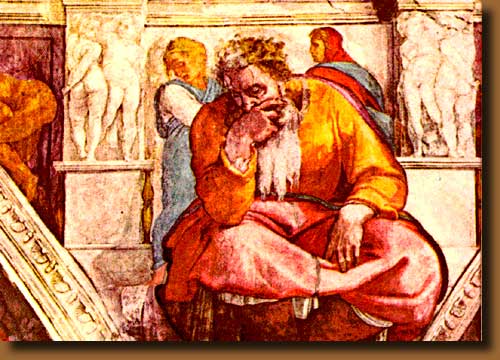 Jeremiah."
Jeremiah."
And this was the context: corruption of the kings of Judah went from ok to worse after its good king Josiah. God allowed invaders to come in the country. The fall was upon them.
So at this present time, already hundreds of Jerusalem’s residents had been forced by Babylon’s king, Nebuchadnezzar into exile. Soon others would be forced to go as well as Babylon was growing stronger by the day.
We know that it was the 10th year of Zedekiah’s reign, another one of Judah’s kings known for his corruption. Though King Zedekiah had struck a deal with Egypt to hold off Babylon a little bit longer in the previous chapters, thinking he’d provided for himself the security he craved, this too would soon fail.
Above all, it’s a storm of confusion all around as they refused to listen to God. However, the worst had not happened yet, but any person with common sense could see that hardships were even going increase.
But to everyone’s surprise: this is not the time when the weeping prophet wept. Oh, to the contrary, at this seemingly impossible juncture, Jeremiah gives a word of hope.
Look with me again at verse 14:
“The days are surely coming, says the LORD, when I will fulfill the promise I made to the house of Israel and the house of Judah. In those days and at that time I will cause a righteous Branch to spring up for David; and he shall execute justice and righteousness the land.”
It’s a promise. It’s a word of restoration. It’s word of the Lord that focuses their attention on their past and not just present that can have redemptive qualities, but on their future.
Seems strange, though, because the people were in mourning. Grief broke out across the land. They were grieving about what could have been. Grief about what will never be. In particular, this grief had everything to do with the loss of David’s dynasty, the history of this family generation after generations leading the people. They were sad to now be even smaller and less significant than they were before. But, to this grief, Jeremiah says, “Don’t call this a tragedy just quite yet.”
Why? Because a “righteous branch” is going to spring forth from David’s line.
If we read this as and Messiah prophetic text (i.e. pointing our attention to Jesus), we see that the one would later be born in David’s city, Bethlehem with Joseph as his father (from the house and lineage of David), then the prophecy came to be. Of course, it didn’t come as the people expected. It didn’t come in the lifetimes of the people who heard this word first. But it did speak for a God who would go with the people through the rocky places of their journey as individual and as a nation and never leave them without hope.
It is true that some prophetic words are harsh throughout scripture, or seem harsh to our ears, but ultimately HOPE is the real motive behind any true prophet’s message. Prophecy is a loving gift of the spirit enabling us who are walking in the darkness of life to see light at the end of the tunnel.
And our exhortation this morning is to wait with prophets like Jeremiah and all the other prophets of our day and time. To wait with expectant ears around those of us whose giftedness is to hear God’s call and then share it with us. To wait in the coming month in celebration of this righteous branch being born! The fulfillment of the great joy!
We don’t talk a lot about waiting with prophets or even the modern expression of prophecy very much in church because when we simply say the word, prophet, we’re afraid. We’re afraid because of all of the negative experiences we’ve had with folks in our world claiming to know God’s plans, only to have their predictions fall on their face. We’re afraid of the Kool-Aid, literally.
But what a shame this is. For I believe the false prophets among us have destroyed the good reputation of what is most needed in our time, those who are willing to tell us the truth. Those who are willing to look at what seems like a “bad situation” and give us hope, just as Jeremiah did with Israel.
Have you ever experienced a person with prophetic gifts? And by this I mean a person who told you the truth—not just in every day conversation, but truth-telling at a deeper level, truth-telling that cut to the heart of a situation you sought to hide or ignore?
We love to speak ill of prophetic types (as much as we like them) because it is true their role is to tell us what we don’t want to hear. Or simply stated, prophetic types can be annoying. They are really good at cramping our style.
In college I had a friend full of these kinds of gifts, prophetic ones. She was a dear to me, however, I didn’t have thick enough skin for her honesty quiet yet. But I would have much to learn.
One afternoon in the middle of my junior first semester, well into the bulk of my education certification coursework, I sat in our shared apartment with this friend. I was practicing my handwriting for my cursive writing class and next up was cutting out letters for my bulletin board making assignment. And this friend took one look at me and the pile of art supplies around me and said, “You’ve got to get out of that major. You’ve got bigger things to do in the world than displaying good handwriting or pretty bulletin boards.”
It was hard to hear of course—I’d planned my whole life around being a teacher and to drop the major mid-way seemed like career suicide. And not that there is anything wrong with being an elementary teacher, but it wasn’t me.
But, I knew she was right. I needed her to tell me the truth. I needed to get off the couch and think about going to seminary. And you need those people in your life too.
Where would I be today without that friend? I can imagine, you’ve had prophetic voices that have guided you, re-directed you and lovingly told you to listen to God afresh also. And without them, you wouldn’t be here today either.
What a great reminder, then this week of Advent is for us to wait with the prophets among us. To give thanks for Jeremiah, his voice, his passion, his word of hope that we get to see fulfilled on Christmas Eve. And for us, to know that God’s word is alive and well and there are spoke people, given as gifts of grace that help us find our way. Because ultimately what Advent is all about is making more room for God in our lives. And, without prophets we might not know where to start cleaning out the spiritual closets weighing us down.
And, an opportunity to know God is here today—here at this table—ready for us to receive what was broken for us, not just for the sake of being broken, but broken so that God’s light might shine in us and in our dark, dark world. Let us gather and shift our hearts to taste and see that God is good beginning. Let us wait for this prophetic word which is the living bread given for us. Let us eat together in expectation of a God who always gives us hope and never leaves us alone.
AMEN
I've seen one family walk through the fullness of "it was the worst of times and it was the best of times."
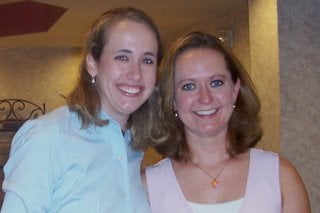 Kristina's father wasn't just any person in my life-- he was a dear friend, a kind man who welcomed me warmly into his family gatherings, vacations and always ready with a good prank or joke.
Kristina's father wasn't just any person in my life-- he was a dear friend, a kind man who welcomed me warmly into his family gatherings, vacations and always ready with a good prank or joke.
He never took life too seriously and was the type of father you knew would one day turn into a wonderful grandfather when his three kids got around to having their own.
After hearing the news, I caught the first plane out-of-town to be with my friend and her family.
For several days. Kristina's parents' house was now full of loved ones, flowers galore and food enough to feed a southern army.
When it came time to sleep the night before the funeral, I asked where I should go. Kristina had joined her mom in the king sized bed in her room, now cold with grief and loss.
The next morning, Kristina, her mom and I got ready together in the adjoining bathroom for the funeral.
Kristina's mom had always called me "just another family member" so she said numerous times in between tears, "I'm so glad you are here."
I sat with the family at the memorial service.
We cried together rivers of tears.
When all was said and done, I slept (or pretended to sleep) on the floor next to them the following evening.
The three of us were together in grief that day. I will always remember.
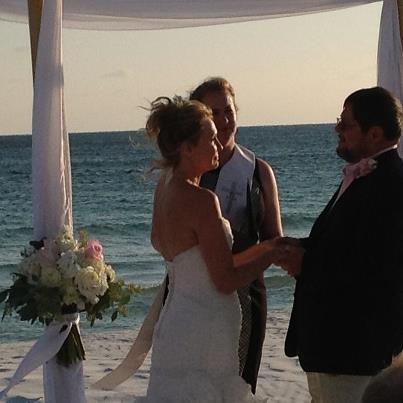 Then, several years later, the three of us gathered in a bedroom once again.
Then, several years later, the three of us gathered in a bedroom once again.
This time, nearly 8 years later, we sat around in a bedroom for a completely different reason, though.
Kristina's mom was getting married again. She was the matron of honor and I was the minister.
And a new man was in the room with us-- a man who would be her new husband, a kind and gentle and loving man, a wonderful addition to this already wonderful family.
As I watched Kristina help put on her mom's white dress and make sure her hair was perfectly aligned and her necklace was on straight, I couldn't help but have my mind go back to that moment when the three of us were in a bedroom together many years ago.
But yet on this day, I saw this mom say with her bright smile:
"Yes, it can. It really can. Life can be beautiful if you give it time." Happiness can come, she declared to the world if you hang on to hope!
And what a testimony this weekend was for me-- when life is rocky, just hang on.
For just as bad times seek to destroy us, the good comes too! I'm glad I'm around to see what comes next-- both the sorrow and the joy that will be.
 1. Best piece of advice I ever got about becoming an adult was- "Make good friends and keep them."
1. Best piece of advice I ever got about becoming an adult was- "Make good friends and keep them."
I ran across this quote last week from Anne Lamott and posted it on Facebook. Seems to be appropriate to share here too: “It's funny: I always imagined when I was a kid that adults had some kind of inner toolbox full of shiny tools: the saw of discernment, the hammer of wisdom, the sandpaper of patience. But then when I grew up I found that life handed you these rusty bent old tools - friendships, prayer, conscience, honesty - and said 'do the best you can with these, they will have to do'. And mostly, against all odds, they do.”
2. In the same way, I recently heard Oprah say recently something to this effect "Some people don't have the oxygen to make up life's mountains with you." Some friends are just for a season. They don't have the oxygen to climb with you, and to make them feel bad about this is not fair to either of you. Keep climbing beside those who do. You might have to make new friends. You might need to rediscover friends from long ago, but it is all good. The climbing partners are there. Keep your eyes open.
3. There's always time for relationship surprises. Henri Nouwen wrote of a now-famous conversation which helped him think about this concept: “While visiting the University of Notre Dame, where I had been a teacher for a few years, I met an older experienced professor who had spent most of his life there. And while we strolled over the beautiful campus, he said with a certain melancholy in his voice, "You know . . . my whole life I have been complaining that my work was constantly interrupted, until I discovered that my interruptions were my work." Maybe that phone call or email or visit that you didn't expect today could be in fact your greatest gift to give the world today . . . something for all of us to think about.
4. Friends can be the family we most need. I give thanks this week for one of my dearest friends, Kristina whom spent a lot of time this week visiting DC with her husband and daughter. Somethings never change like the fact that folks either think we're related or they mistake us for one another from a distance. It was fun to be called, "Kristina" this week again when a church member couldn't tell us a part. And to finish each other's sentences!
5. To love someone, though is not to cling to them. Can I say how much I have loved the book, Awareness by Anthony de Mello. It's a text that I know is not new to the world (was published in 1990) but it has been the gift that has kept on giving to my life in the past month. Every morning de Mello and I have a date and it's wonderful! And he writes this: “Perfect love casts out fear. Where there is love there are no demands, no expectations, no dependency. I do not demand that you make me happy; my happiness does not lie in you. If you were to leave me, I will not feel sorry for myself; I enjoy your company immensely, but I do not cling.”
6. To love someone, is also to hold them close in committment. One of my favorite quotes about this, I blogged about this over a year ago, here.
7. "You can only be as close to the heart of God as you allow your heart to be to others." A spiritual director imparted this wisdom to me years ago. It was a season of my life when I was wrestling with how much time I spent studying for school and how much time I allowed my daily patterns to be spent with a group of people I was growing very close to. Her words encouraged me that friendship is as much of a spiritual discipline as is prayer, quiet, service, etc.
8. Can pastors be friends with parishioners? Such is a question that is frequent discussed in my clergy circles. Most of my colleagues seem to have a different opinion about it usually based on their personality, family situation and church size. I've come to believe that while maintaining healthy boundaries is appropriate, it's a decision that everyone has to make for themselves. Sometimes it works and sometimes it doesn't.
9. Friends are those who walk beside us and love giving the good gift of silence. Sometimes there are no words for the grossness of life that we are asked to walk through with each other.
And because one can't get enough of Henri Nouwen on this topic, here's another quote of his that I adore: "“When we honestly ask ourselves which person in our lives mean the most to us, we often find that it is those who, instead of giving advice, solutions, or cures, have chosen rather to share our pain and touch our wounds with a warm and tender hand. The friend who can be silent with us in a moment of despair or confusion, who can stay with us in an hour of grief and bereavement, who can tolerate not knowing, not curing, not healing and face with us the reality of our powerlessness, that is a friend who cares.” from The Road to Daybreak: A Spiritual Journey
10. True friends are those whom you tell the same story to at least 10 times knowing that when you need to tell the same story over for the 11th re-telling they'll be around to hear it then too. Who says stories only need to be heard once? Thank goodness there are those who can hear us into understanding!
Here's to hoping your life is filled with some moments to share today with those whom you call friends!
 Today is Valentine's Day . .. a day that I know many of my friends hate. I even saw someone recently wearing a t-shirt like the picture to the right. I totally understand. It can be a rough world out there in the commercialism that we call American holidays especially for those who don't have what our culture says is a "must have" (i.e. a happy romantic relationship).
Today is Valentine's Day . .. a day that I know many of my friends hate. I even saw someone recently wearing a t-shirt like the picture to the right. I totally understand. It can be a rough world out there in the commercialism that we call American holidays especially for those who don't have what our culture says is a "must have" (i.e. a happy romantic relationship).
But, though I am happily married (and I know this means that some of you will stop reading here), I need to tell you that I love Valentine's Day. I have loved this day even in my "I'm sad to be single years." For me it has never been about the special someone in my life. It has been a day about love, something we all know something about.
I love this day because it is a wonderful excuse to tell the beautiful people in my life how much I love them. I love the beautiful people who make up my congregation who model for me the faith calling of simply being themselves! I love the amazing people-- though the number is small-- who still keep in touch with me from college and high school who remind me who I've always been. I love the faithful saints of friends who are in my every day life-- who make every day trips to the grocery store or out to dinner a major event of laughter. I love the colleagues that I have in ministry who are all across the world who challenge me and encourage me to keep going even when I feel like quitting.
I love this day because I am one of those people who often feels like the intentional ways I like to show my love to others on other "normal" days of the year can be too much. You know, authentic expressions of love can be intimidating for some not accustomed to receiving. So for me, Valentine's Day is perfect. It's a day all about showing and telling those in your life that you love that you do love them. So, I do a lot of it!
I'm sure some of my affection for this day comes from the fact that I grew up in a household where Valentine's was one of our most celebrated days. While in grade and high school, my mom always hid presents in our chairs at the breakfast table with Vday gifts. Neither of us were big chocolate or candy eaters (I know weird) so we always got small gifts. Usually I found a new red t-shirt to wear to school or new pj pants. We'd always be served heart-shaped toast . . . a tradition I still keep up with whoever is in my household on Vday.
 Then, my Vday love started to get out of control when I made that last-minute visit to Duke Divinity School in exploration of a call to go to seminary there on Valentine's Day 2003. It was the day I met with the admissions director, Donna Claycomb and also met three folks who would become some of my closest friends in the journey of seminary ahead: Abby Thornton, Jenn Brown and Clark Williams. At the end of the day, Donna gave us all cookies on a stick in the shape of hearts as her pastoral way of saying, "Thank you for coming." She wanted to show her love to us as we were in this scary time of trying to figure out what would be next in our lives. It was on that cold Friday, Valentine's afternoon that I left Durham knowing that Duke was the seminary for me.
Then, my Vday love started to get out of control when I made that last-minute visit to Duke Divinity School in exploration of a call to go to seminary there on Valentine's Day 2003. It was the day I met with the admissions director, Donna Claycomb and also met three folks who would become some of my closest friends in the journey of seminary ahead: Abby Thornton, Jenn Brown and Clark Williams. At the end of the day, Donna gave us all cookies on a stick in the shape of hearts as her pastoral way of saying, "Thank you for coming." She wanted to show her love to us as we were in this scary time of trying to figure out what would be next in our lives. It was on that cold Friday, Valentine's afternoon that I left Durham knowing that Duke was the seminary for me.
The next year, when Vday came around again and Abby, Jenn and I were hanging out (maybe studying?), we made cookies on a stick (thanks to directions from Donna) in thanksgiving of being friends for a year. Now, every February, I make heart-shaped cookies on a stick and continue to celebrate with these folks and new friends too. Now as a pastor, I often go visiting to shut-ins and widows on Valentine's Day-- taking cookies and saying a word to them about how glad I am to have them in my life, even on a day that might bring up memories of sadness.
Today, I am not able to keep up the shut-in visitation or the heart-shaped toast part of my Vday tradition because I'm taking a couple of days off to spend with my husband in the Midwest. I'm tagging along on his business trip because we both really wanted to be together on this day. I love him so much to suffer through some really cold weather and the piles and piles of snow on the ground 🙂 I'm of the belief that if you have something good in your life (and Kevin is one of the really goods for me), then it needs to be celebrated and celebrated big.
So, what's the point to this personal ranting "I love Valentine's Day" blog?
Maybe I can not win you over to my level of Valentines love, but I hope I can encourage you to get out there and tell someone who you love them. It doesn't have to be a spouse, a boyfriend or a partner, but someone. No matter who we are, we all have people in our lives that we love and hopefully love us in return. What a great day to just do something for one of these folks, so there is no doubt in their minds how we feel about them! Spread the love, my friends. Spread the love. It really can be a great day.
I've done a lot of thinking lately about the past . . . things that have happened in my life 10, 15 or even 20 years ago. I've thought a lot about how I got to be where I am. I've thought a lot about the people who have helped see at different junctures the gifts that I could not see in myself. I've thought a lot about God's hand of provision at my most desperate places. I've thought a lot about one of my favorite hymns, "He Leadeth Me" which testifies to just this truth of God's gently guiding me, guiding us along the way. In particular, I've recognized.
It is amazing to me that a young girl who had never seen a woman preach and thought it was "not a woman's place" turned out to be one.
It is amazing to me to think of the moments when I felt so unseen, so un-lovable that there were those who loved me, though I may not have been able to recognize it at the time.
It is amazing to me to think of how full circle life can turn out to be-- people, circumstances, or hopes that you long thought were long gone from your life come around again and be full of such blessing.
In all of these things, the wisdom for the future that surfaces is "stay the course." And, by this I mean, as much as life seeks to bump us all off the course, our job is to just stick with it. To know ourselves and to live out of ourselves and not to believe anything less about what we sense to be true about our lives.
When I was in high school, as many at this age experience, I just felt out-of-place. I felt like no one really knew who I was. Can you say awkward?? This was me in almost every sense of the word. Dress, presentation, interactions with others, you name it. This was me.
However, I knew I liked encouraging others . I knew I liked organizing and leading things with purpose and that validated others' gifts. I knew I liked paying careful attention to the details of others' lives so to connect with them richly. I knew I liked public speaking and got great joy out of someone receiving hope from something I said. But, in all of these good gifts I felt completely defeated. Why? Because I lived under a value system where none of these heart bursts of mine were assigned much if any value.
. I knew I liked organizing and leading things with purpose and that validated others' gifts. I knew I liked paying careful attention to the details of others' lives so to connect with them richly. I knew I liked public speaking and got great joy out of someone receiving hope from something I said. But, in all of these good gifts I felt completely defeated. Why? Because I lived under a value system where none of these heart bursts of mine were assigned much if any value.
So, I tried to be what others saw as "good." Yet, this was like hitting a wall time and time again. I wasn't good at sports. (I even got a C+ in PE once because of my kept falling off the aerobics bench during the routines). I wasn't good at voicing my opinions in a crowd. I wasn't good at telling others that I needed them as much as I communicated thoughtfulness to others. I was afraid. I felt lost. I wondered why people didn't seem to like me as much as I liked them. I just couldn't find my niche.Deep pains from this time in my life still eat at me now, if I let it.
In response, I could have become full of rage. I could have started living into destructive patterns of behavior. I could have rejected the faith I was given as a child. And, I'm sure no one would have blamed me.
But, in all of this mess, my life was saved, I know, because I was given this grace from God: fire to stay the course. Though I didn't have words to articulate this concisely at all, I knew what direction my life was going. And gradually, I found friends, mentors and colleagues who with great patience would beat it into my head that I was loved and my gifts mattered. Through such crumbs of encouragement, I knew that if I just stuck with life long enough it would get better. I knew eventually people would really see me truthfully. I knew I had to fight for my own life, even if no one else did. Because my life mattered. And, I needed to live out my calling. Otherwise my soul might start to die.
And, I'm so glad I did. I am so glad I became a pastor.
People ask me all the time, now as a pastor, for advice. I really don't feel comfortable with this because I mostly see my pastoral work as that of deep listening. However, if folks insist, I usually go toward the writings of Parker Palmer who says, listen to your life. Here's my Elizabeth paraphrase of his ideas:
Let your life talk back to you. Let the divine gift of direction swell up in you and don't be afraid to believe in your own blessedness. No matter if no one but you recognizes it at the time and not matter how much you feel beat down, keep believing and soon others will too. It is going to get better. It always will get better.
This is my testimony for today: stay the course. It got so much better for me and it will for you too.
 Do we truly understand how much God loves us and wants to bless us?
Do we truly understand how much God loves us and wants to bless us?
Today in worship we talked how BLESSING is one of the themes found in Matthew's Beatitudes-- that as Jesus spoke these words of "Blessed are . . ." he was seeking to tell this followers exactly how he already felt about them. Jesus spoke to the disciples not as those whom he was commanding to act a certain way, but as a loving teacher to a group of people he cared deeply for.
We also talked about how hard it is for us to receive Jesus' blessing on us because we want to assume it comes with conditions that sound like "you must do this first." Could Jesus possibly love us even if we don't come to him in perfection yet?
Henri Nouwen, a Catholic priest, author and professor, tells the following story about how hard it is for all of us to receive blessing but also how each of us hungers for it more than we realize.
While living in the L'Arche community for mentally and physically challenged adults called Daybreak in Toronto, Canada as a resident chaplain, he found himself in the following conversation with a patient there while going about his daily chores:
A woman named Janet came up to Henri and asked for a blessing. In response, he remembers walking up to her and giving her a little cross on her forehead.
But, she said, "Henri, it doesn't work. No, that is not what I meant."
Henri notes that was embarrassed and said, "I gave you a blessing." She said, "No, I want to be blessed." He kept thinking, "What does she mean?"
[Later on] there was a worship service. After the service Henri said, "Janet wants a blessing." He had an alb on and a long robe with long sleeves. Janet walked up to Henri and said, "I want to be blessed." She put her head against my chest and he spontaneously put my arms around her, held her, and looked right into her eyes and said, "Blessed are you, Janet. You know how much we love you. You know how important you are. You know what a good woman you are."
She looked at Henri and said, "Yes, yes, yes, I know. I suddenly saw all sorts of energy coming back to her. She seemed to be relieved from the feeling of depression because suddenly she realized again that she was blessed. She went back to her place and immediately other people said, "I want that kind of blessing, too."
Henri went on to recount, "Then, countless people kept walking up to me and I suddenly found myself embracing people. I remember that after that, a man in our community who assists the handicapped, a strong guy, a football player, said, 'Henri, can I have a blessing, too?' I remember our standing there and I put my hand on his shoulder and said: "you are blessed. You are a good person. God loves you. We love you. You are important. Can you claim that and live as the blessed one?"
And this process, according to Henri, went on and on for days as members of the community heard that he gave out blessings."[i]
We all need blessing more than we sometimes know.
So, after I shared this story in my sermon and we had a service of communion with one another, I offered the congregation a blessing if they wanted it. Several deacons assisted in this by standing to the side of the room with hands open wide to give hugs and the blessing of "Jesus loves you." Several folks told me after the service how powerful it was for them to leave worship with the experience of having a blessing instead of just hearing about one for others. I think we might just need to engage in this spiritual practice of hugging more often.
Worship with a hug . . . sometimes it is the smallest gestures that can be so powerful.
[i]
http://www.csec.org/csec/sermon/nouwen_3502.htm
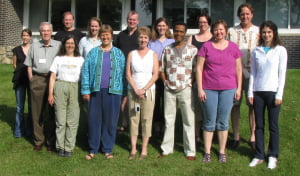 The pace of life here at Collegeville has been divine. It has included all of my favorite things: quiet, tasty food in just the right portions, beyond the surface conversation, learning from a scholar, peace-filled sleep and a room with a view of water.
The pace of life here at Collegeville has been divine. It has included all of my favorite things: quiet, tasty food in just the right portions, beyond the surface conversation, learning from a scholar, peace-filled sleep and a room with a view of water.
In the afternoon we've gathered together as a group-- all 12 of us for a writing workshop, each day several submissions of writing for group feedback and commentary. Because I was not an English major in college, it all was a new thing for me. A fear producing exercise: to ask for feedback on a non-fiction piece about me from my well-read, well-spoken and theologically gifted new friends. The only comfort I came thinking that others just might be as terrified as I was!
In the process of the past four days, I've paid attention to many details that I normally would ignore as we have all carefully probed one another's prose for sense of tone, voice, style, flow and pace. (Who knew these things could be talked about for so long?)
As I've been living in the writing world and participating in these workshops, I've been making a list in my head all week of, "You know you've spent a week in a writing workshop if . . ." I thought it might be humorous to share a few.
I told Kevin all about what I have been learning tonight over the phone. He was not impressed (as you might not be either), but among new peers I'm smitten with these new inisghts. The tools of my craft finally have names!
It's a world I'm just learning to be a part of in an official capacity and even though the writing workshop afternoons became sweaty palm inducing at first, I'm sort of sad they are over. I've learned it is Christmas morning pleasure for writers to be around other writers who care about making their work better as much as they do. And, I'm going to continue to open as many shiny presents as long as I am here.
Does calling to a particular congregation automatically mean you are required to give your whole life to a particular group of people?
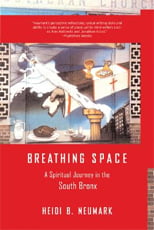 Recently, I finished a wonderful pastoral memoir called Breathing Space: A Spiritual Journey in South Bronx by Heidi Neumark. Heidi is a Lutheran pastor who writes about her 20ish year journey with a congregation in transformation in a neighborhood also in transition. Pastor Heidi lived in the neighborhood where she worked and full enmeshed herself and her family (husband and two children)-- worshipping, playing, and shopping in the blocks surrounding her church.
Recently, I finished a wonderful pastoral memoir called Breathing Space: A Spiritual Journey in South Bronx by Heidi Neumark. Heidi is a Lutheran pastor who writes about her 20ish year journey with a congregation in transformation in a neighborhood also in transition. Pastor Heidi lived in the neighborhood where she worked and full enmeshed herself and her family (husband and two children)-- worshipping, playing, and shopping in the blocks surrounding her church.
The journey Pastor Heidi described I found much kinship in, even though our settings are quite different. She arrived at a congregation without the physical, emotional or spiritual infrastructure for long-term survival. She was greeted, nurtured and sustained in her early years there by some amazingly faithful saints of God who inspired her to fully commit herself to the work at hand. She saw in her diverse faith community great potential.
While it was a beautiful journey to read about, I begged to ask myself the question on countless occasions while reading it, how in the world was this pace of life sustainable? And, it seemed that Pastor Heidi asks herself this question over and over again too; thus, the title of the book, breathing space.
Yet, there were points in the book where my heart stirred for her because it seemed that she was so close to finding the answers but just kept on working "for God."
Consider this, Heidi Neumark writes:
We had a German student, Bend, staying here and visiting the church for two months. At the beginning, he asked me about friendships in the parish and how it worked to maintain friendships in other places. I said that it was hard to do because most of our friends now lived at some distance, but that it didn't bother me at all. My work and my family were more than enough. When I said it, I believed it was true. But I remembered exactly what I was doing when he asked the question. I was standing at the sink washing pesto of the dinner plates. I remember the Brillo pad in my hands, the pieces of green pasta and bits of garlic stuck to the plates, the running water. I washed dishes countless time since then, but I can't remember one. I was fooling myself when I thought it was an easy question.
It is true that my work and my family fill my heart and occupy my days. . . . It was easy to become Bernd's friend because it was convenient. He was right there. When he left, I had to ask myself-- am I sad because Bernd is leaving or because another friend is moving out of reach? It was both. But friendship is not always, or at least in my circumstances, not usually convenient. (90-91).
Of course, friendship is not always convenient. It really isn't, and usually the things that are most life-giving to our souls aren't.
One of the biggest sins, I think, of those serving in pastoral ministry is regularly doing what is right in front of us. Someone need to go to coffee? I'm there. Someone in the hospital for the fifth time this month? Sure, I'll visit them again. Need someone to serve on this denominational board? Sure, I can go to those extra meetings. We just aren't good at saying, "No" or "Later."
I believe such practices are where we as pastors hide, under the banner of "the busyness of ministry." To this, I say, ministry is only as busy as we make it. Of course there are unexpected funerals. Of course there are unexpected building issues. Of course there is someone who needs to talk on a day when such is not scheduled. But, when we look at our calendars, as ministry leaders, are we intentionally making time for things that matter to us?
Are we finding breathing space through relationships outside of the church?
Are we talking time each week to remember we are always more than our jobs?
Are we finding more out about the people God has made us to be so that upon retirement we aren't just starring at the walls wondering who we are without the church to tell us?
The longer I read Pastor Heidi's memoir, the longer, I wished for her a long retreat with some of the dear friends that she mentions moving away. I wished for her a longer time a part each year from her church so to get an even great respect for its context. I wished for her peace, so not to feel as if she was carrying this burden of a church in transition alone.
Breathing space after all, I don't think just comes to us. We have to grow a place in our souls and calendars for it to live. And, how beautiful such space can truly be!